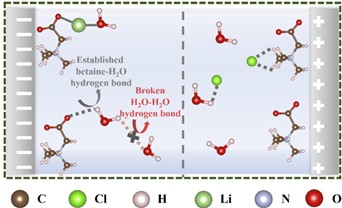Aqueous supercapacitors have garnered significant attention due to their exceptional capacitive properties, high safety, and environmental friendliness. However, the narrow electrochemical stability window of water (1.23 V) limits the energy density of these devices, hindering their practical applications.
To address this challenge, a research team led by Professor Lei Li has developed an innovative strategy to enhance the working voltage and charge storage capacity of electrodes by regulating the solid-liquid interface properties between activated carbon and aqueous electrolytes using zwitterionic betaine. The betaine forms a uniform coating on the activated carbon surface, preventing direct contact between the aqueous electrolyte and the carbon matrix.

This approach operates through two synergistic mechanisms:
Voltage Expansion: Betaine adsorbs water molecules from the electrolyte, forming new hydrogen bonds that disrupt the original hydrogen-bonding network of water. This reduces the activity of water near the activated carbon, enabling the device's operational voltage to increase dramatically from 1.0 V to 1.4 V.
Capacitance Enhancement: Owing to its stronger ion adsorption capability compared to activated carbon, betaine elevates the specific capacitance from 21.35 F g⁻¹ to 27.73 F g⁻¹ at 1 A g⁻¹.
The combined effects yield a remarkable 2.5-fold increase in energy density (from 2.97 Wh kg⁻¹ to 7.55 Wh kg⁻¹) and a 1.5-fold improvement in power density (from 4.54 kW kg⁻¹ to 6.82 kW kg⁻¹). Additionally, the device demonstrates exceptional cycling stability, retaining nearly 100% capacitance after 10,000 cycles at 1.4 V and 4 A g⁻¹. The strategy also significantly reduces leakage current and voltage drop.
Published in Energy Storage Materials under the title "Regulating Electrode/Electrolyte Interphase Property via Betaine to Turbo Supercapacitor Energy Storage", this work was spearheaded by Xiaoyu Zhou (first author, Master’s student at Xi’an Jiaotong University), with Assistant Professor Xiaowei Shi and Professor Lei Li as corresponding authors. The National Key Laboratory for Mechanical Behavior of Materials at Xi’an Jiaotong University served as the sole affiliation. The study was supported by the National Natural Science Foundation of China.
Link to the paper: https://www.sciencedirect.com/science/article/pii/S2405829725004246
Professor Li’s team has made serial advancements in aqueous supercapacitors, including electrode structure design for optimized electron/ion transport (Chem. Eng. J. 2024, Energy Environ. Mater. 2024, Nano Res. 2024, Adv. Funct. Mater. 2020, Energy Storage Mater. 2020) and electrolyte engineering (Adv. Funct. Mater. 2025, Energy Storage Mater. 2023, J. Energy Chem. 2023). Their innovations not only enhance energy storage performance but also enable stable operation across extreme temperatures (–60°C to 100°C), paving the way for wide-temperature-range applications of supercapacitors.


